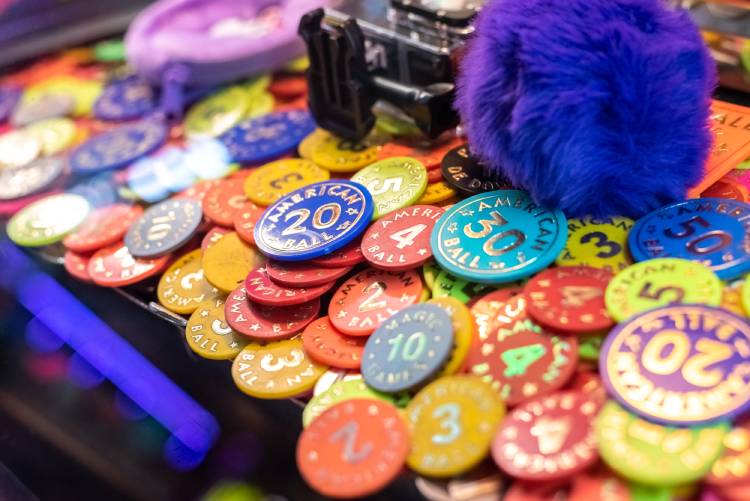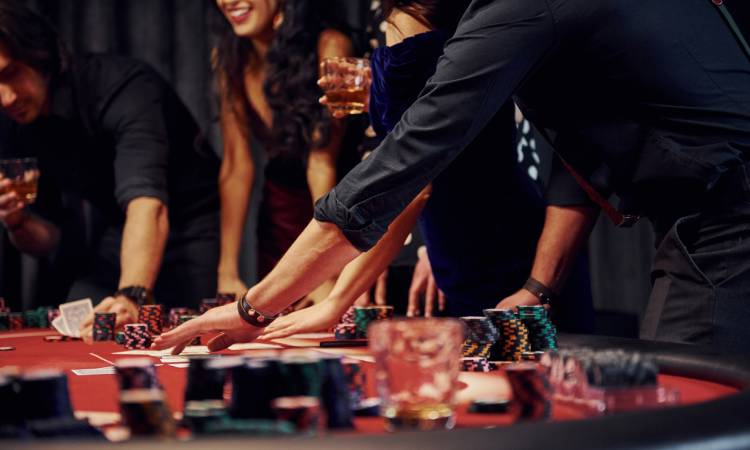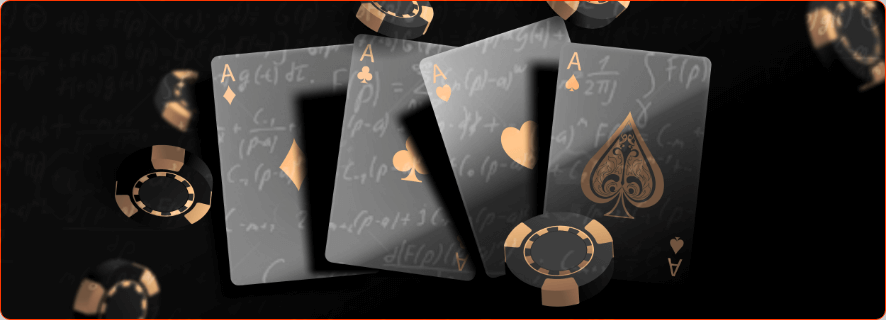Blackjack Odds – Guide To House Edge, Probability, RTP
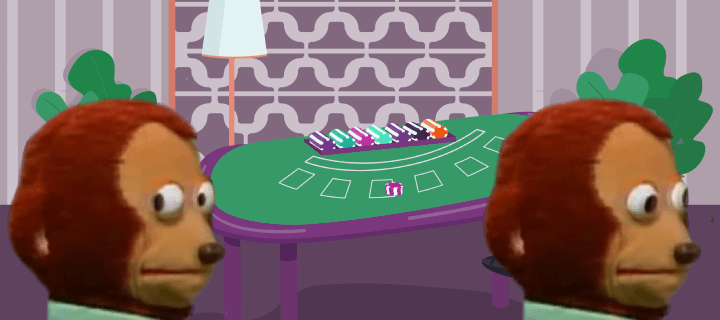
Blackjack is an intuitive game that boils down to odds and making correct mathematical decisions. But here’s the kicker: Mastering blackjack games shouldn’t have to be a time-consuming process.
It requires having a deeper understanding of those odds for every scenario you face. This includes being fully aware of the house edge during each round and what advantages we players have at our disposal to lower it. So let’s start with the basics and work our way up to higher mathematics.
Developing A Basic Strategy
The basics for the optimal blackjack strategy are actually pretty straightforward:
- Know your advantages
- Gauge your odds
- Beat the dealer
Remember, you don’t have to know everything by heart. We will dish out a few charts to help you better navigate the blackjack table and with practice, everything will fall into place naturally. Just apply even the most basic strategy, and we guarantee you will level up your game whenever you play for real money. The first thing you should consider is…
The House Edge In Blackjack
As with most casino games, the house will ALWAYS have an edge. After all, this built-in advantage is what keeps the casinos’ money-making wheels turning and online casino signup bonuses available to players. In the case of blackjack, we players have to act first at the table. Plus the dealer sees your cards, whereas you do not see theirs.
Every time we hit a card and go bust – which happens roughly 30% of the time – we will lose despite the fact that the dealer went bust as well. This is something you just can’t beat, so you might as well accept it.
But all is not lost. Even though we can’t beat the house every single time, we all have a few tricks at our disposal to minimize that statistic percentage. To be exact, the house has an edge of about 8% on us players, but it’s possible to lower this number down to as little as 0.5%, depending on the rules at the table.
The Player’s Advantages In A Blackjack Game
So yes, the dealer has a huge advantage by always acting last. However, we have some tricks up our sleeve that may turn the tides in our favor. These include:
- If the dealer doesn’t also have 21, every time we manage to hit 21 and get a blackjack, we get paid extra as this pays 3:2 (2.5 times the stake). Otherwise, we’d just get our stake back.
- Having the choice to stand or hit is beneficial to us players because the dealer is extremely limited in this regard. Dealers are forced to hit on all card combinations up to a value of 17, regardless of whether the dealer has us beat with a lower hand value.
- The double-down feature is your friend. It allows us to double our stake at times whenever we are at an advantage. It’s these moments when we are able to maximize our winnings.
Splitting pairs is also your friend. It allows us to improve weaker hands and also take advantage of the dealer’s weak ones. - There are times when we have the possibility to employ the blackjack surrender strategy. It enables us to get half of our stake back. In the long run, this move can be a lifesaver, especially since the dealer doesn’t have this option available.
The Importance Of Odds – Making The Right Choice At The Right Time
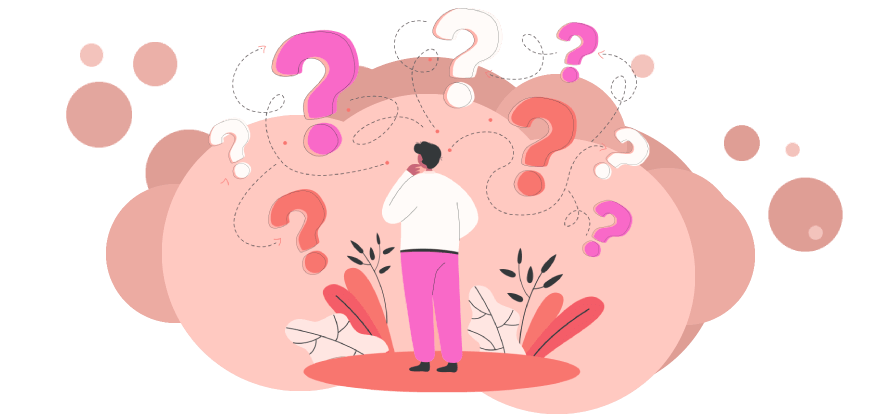
There’s very little hope if you rely solely on luck, so understanding the odds the respective blackjack variant offers you is a must. Essentially, it determines your probability of winning or going bust in a particular situation. Odds are quite dynamic since they are influenced by a number of factors – the rules of the game, the house edge, and the number of decks in use.
Obviously, whenever there’s a high chance of surpassing 21, by all means, refrain from hitting. But you need a more elaborate plan than that. Without it, you are bound to lose more in the long term, even if you are deeply familiar with the odds themselves.
There is one probability theory that should always be kept close to mind. Known as the law of large numbers, it partly explains why the casinos have the upper hand, even in games such as blackjack where players have higher chances of winning compared to, say, roulette.
This theory shows us that the bigger picture is more important than each individual round. Put another way, even if you manage to beat casinos in a game of blackjack, it doesn’t really matter because their accumulated earnings overshadow our small victories. Without a strategy that lessens the house edge, you won’t be able to do much to alter this reality. No matter which cards you have been given, it’s incredibly important to be aware of the chance of winning and the probability of busting.
Understanding Odds & Probability
If you’re not into maths, don’t worry. Probability isn’t like algebra. Instead, it tries to determine the likelihood of a particular event to occur or a certain result to be achieved. This is unbelievably handy in the gambling world. In order to determine the probability of an outcome, you have to rely on the probability formula – the number of ways divided by the number of possible events.
Let’s try and figure out, for instance, the probability of getting an ace of hearts. In a single pack of cards, there is only one such card, right? If a standard deck has 52 cards in total, that means the probability of receiving this card is 1/52. Put another way, there is only one such card in a single deck and the rest of the remaining 51 cards are not an ace of diamonds. In conclusion, the odds in this situation will be expressed as 51:1.
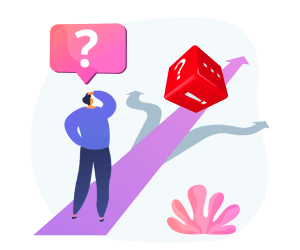 In terms of blackjack odds, there are two useful terms that should cross your mind constantly: Positive and negative expected win rates. They serve to describe the odds you have under certain circumstances during the game. Another more commonly used term is true odds. In layman’s terms, they determine when a certain wager pays out at the same rate as the probability percentage suggests.
In terms of blackjack odds, there are two useful terms that should cross your mind constantly: Positive and negative expected win rates. They serve to describe the odds you have under certain circumstances during the game. Another more commonly used term is true odds. In layman’s terms, they determine when a certain wager pays out at the same rate as the probability percentage suggests.
Blackjack is all about forming a higher total than the dealer’s – without surpassing 21. You can only hit or stand, and each move can make or break you. This is where a basic blackjack strategy chart might come in handy.
However, knowing your odds of busting might do you more justice here. It helps us to get to grips with the logic behind the suggested moves. That, and it’s much easier to memorize things this way.
So, for instance, if you have a total of eleven or less in your hand, the odds of busting are 0%. Increase that total number to 12, 13, or 14 in your hand and the odds of busting rise to 31%, 39%, and 56% respectively. Ultimately, with the hand total of 19 and 20, hitting might not advisable since your odds are 85% and 92%.
With this in mind, let’s take a look at the blackjack odds table to see what the bust probabilities are when you hit an extra card to your starting hand:
Probability To Bust On An Extra Card
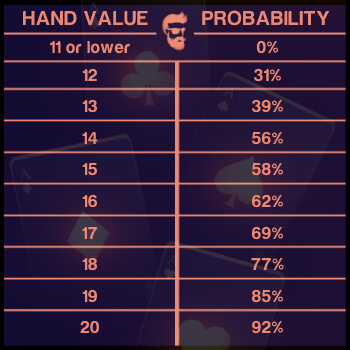
The logic is simple: The probability of going bust increases with the hand value you got. But that’s the twist with blackjack – you still need to reach as close to 21 as possible to ensure a winning hand.
Why is this important? It also gives us insight into the probability for the dealer to bust, depending on the first card shown.
Bear in mind that the following probability percentage for this varies depending on the rules; if the dealer has to stand or hit on soft 17.
The Dealer’s Probability To Bust
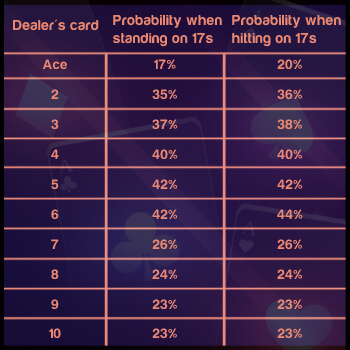 Using simple math, the dealer has an average bust rate of 28.36% on any given hand. If we take a look at the chart, we can see that 4, 5, and 6 are the dealer’s biggest bust cards.
Using simple math, the dealer has an average bust rate of 28.36% on any given hand. If we take a look at the chart, we can see that 4, 5, and 6 are the dealer’s biggest bust cards.
But this begs another question: How do you know whether or not you should hit or stand and hope for the dealer to bust in a given situation?
That’s why your best bet would be to take your own bust-out rates into consideration. Only when your chances of busting are greater than the dealer’s chances is the best time to stand.
RTP (Return To Player)
You are bound to stumble upon this term in casinos: Return to Player. The RTP is also measured in percentage. It’s a theoretical way to determine your payout – the expected return of all wagered money, to be exact.
This factor will always differ from one blackjack variant to another. The higher the RTP percentage is, the more beneficial a particular game is, and vice versa. Figuring out your RTP percentage requires knowing the house edge. In other words, these two terms are interdependent.
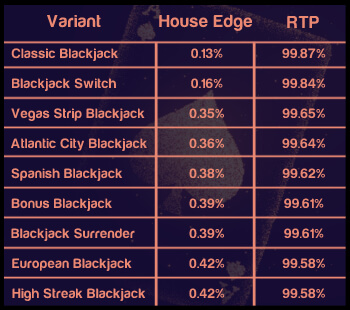 If we take for example the Atlantic City Blackjack by Microgaming, which is played with eight decks (standard rules), the house edge stands at 0.46%. Consequently, the RTP is 99.64%. What does this mean? Well, theoretically, every time you place a $100 bet, the expected return is $99.64.
If we take for example the Atlantic City Blackjack by Microgaming, which is played with eight decks (standard rules), the house edge stands at 0.46%. Consequently, the RTP is 99.64%. What does this mean? Well, theoretically, every time you place a $100 bet, the expected return is $99.64.
However, the reality tends to be different than that because the RTP percentage applies to basically everyone. A low house edge serves one particular purpose: your bankroll will last much longer, which will prompt players to play longer and more often.
How Rule Variations Influence The House Edge
Whenever the rules are changed, the house edge is directly influenced by that change. This will affect your potential profit as well. Also, keep in mind that some variations have a fixed set of rules, whereas others don’t. And the online casinos have the power to alter them whenever they wish.
One of the most common rule variations is the number of decks included in the game. The fewer decks in use – the lower the house edge. With every pack of cards added, the house edge automatically goes up. Let’s say eight decks of cards are used. That means the house edge is increased by 0.61%.
The soft 17 rule also significantly impacts the house edge. It is directly related to the dealer’s play. Whether the dealer hits or stands on soft 17 varies depends entirely on the casino and the variation of your choice. Games that prompt the dealer to stand on soft 17 will work in your favor, otherwise, the house edge gets increased by 0.21%.
Another concern is whether you are allowed to double down or split. Generally speaking, the more options you have for these two moves, the lower the house edge is. Not being able to double down after splitting increases the house edge by 0.14%. Also, if you are not allowed to hit split aces or to re-slit them, the house edge goes up by 0.18% and 0.07% respectively.
Lastly, you should also take into consideration the payout for blackjack. If it deviates from the standard 3:2 (or in some cases 6:5), the house edge increase by 1.30%.
Tips On How To Reduce The House Edge
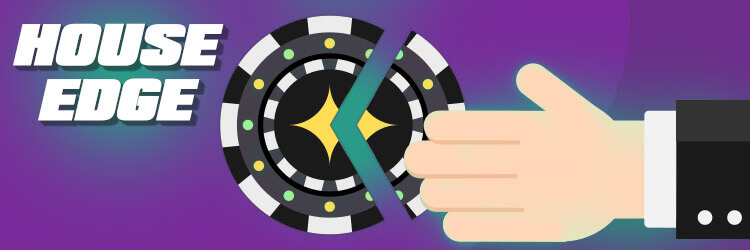
Blackjack has a way of lowering the house edge the most. That’s what makes it one of the casino games with the best odds. Of course, there are variations that are considered to be disadvantageous for the players. But generally speaking, most blackjack variants have a house edge which is lower than 1%, providing that you use a basic strategy.
If you manage to apply it correctly throughout the game, that number can be reduced as low as 0.5%. But if you fail to do so, it can climb up to 2%. This percentage can be influenced by preparing yourself for all of the possible hands and situations that come your way.
Note that knowing the basic strategy in order to reduce the house edge is not enough. You need discipline, self-control, and you can also learn a card counting system and some other useful tips on how to improve your overall performance on the table.
Card Counting
Advanced players love this method. Yes, it’s more complicated because you are required to continuously keep track of the cards on the table during the game. Pair this with even the most basic of strategies, and you might be able to make it rain without a hitch. This is the reason why you need to master the latter first before you proceed to learn a card counting system.
If you’re new to this, don’t be discouraged. Take advantage of a card counting system by simply using one which has a low difficulty level. This will help you get to grips with the ratio between high-value to low-value cards. Moreover, such information can also help you figure out the expected average win rate per hour.
But don’t be fooled. Blackjack, like all games in online casinos, the house edge will always take its toll eventually. In order to achieve your goal, you need to focus on the bigger picture as these strategies come into effect only in the long term.
Casino Comps
Getting high-value comps is another useful technique that can help you succeed in gaining the upper hand while playing blackjack. If you’re not familiar with the term, this is simply short for complimentary. Think of them as perks that you receive for placing bets and playing blackjack.
Not all players receive the same perks. This depends on various factors, such as the number of bets you place or the time you spend playing. But overall, blackjack is a great opportunity to take advantage of such perks because it can directly or indirectly affect the house edge. In order to acquire the casino comps, you need a Player Card which you give to the dealer at the beginning of the game.
Play At A Full Table
Another hot tip is to try and join tables that are full of players. This way, the pace of the game decreased. Not only that, the number of hands you play is decreased, which may potentially minimize your expected loss. So not only will you be getting casino comps but you will also have enough time to make calculated decisions. Oh, and note that if you manage to minimize the house edge by using all these methods, the comps you receive will most likely come at a better value.
Play Blackjack Games In Some Of The Best Casinos
Here are our casino top picks where you can play blackjack games like a boss (click on the image to check out our 2022 online casino reviews):
Online Blackjack Odds Summary
In blackjack, the house edge tends to be one of the lowest. But without any deeper understanding of the odds of winning in blackjack, things can go downhill in an instant. Heck, it’s easy to believe that hitting on a hand value of 12 would always be the right decision. But there are circumstances where that wouldn’t be a smart idea.
Even though you got a weak hand, the dealer could also have a weak one (a six, for instance), which means that the dealer would have a high probability of busting, right? Well, focusing on your own hand is a very common mistake as the dealer’s probability of busting is just as important to have in mind. If not more important.
Remember, each casino game is unique and each bet you make can make a world of difference. Yes, you can count cards. And don’t start pulling your hair if you go on a losing streak. That’s when the biggest lessons in gambling are learned. We got you, Bro!









